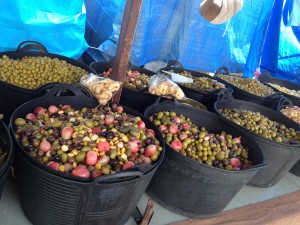Too many people think farming is black or white and that farming should be one way or the other. I find this shocking, especially since we live in a world of “gray.” One such topic is conventional v/s organic agriculture.
So what does it mean to be organic? Organic parcels must be certified to ensure that synthetic pesticides/fertilizers have not been applied within the past three years. All pesticides/fertilizers that are applied (Yes, many -if not all-organic farmers apply pesticides) are either derived from biological products (e.g. manure, guano, Bacillus thuringiensis, compost tea) or mined from the Earth (copper sulfate, sulfur, etc.). Parcel and chemical certification is usually done through a third party group. In California, California Certified Organic Farmers (CCOF) is a common certification program. The years prior to receiving certification (years 1-3) require the use of approved products and are considered transition years.
What about conventional farming? Essentially, the major difference is that pesticides/fertilizers used can be synthetic and the land does not require certification. Pesticides that are used – at least within California-are highly regulated in use and a recommendation must be written by a certified pest control adviser. Since most nitrogen is made through a chemical process known as the Haber-Bosch, these systems tend to have more nitrogen applied, but yield higher (although with a lower price).
I have worked with many farms over the past years, both organic and conventional. I have found challenges in both operations. Probably a distinctive difference was the amount of labor that it took to farm organically compared to conventional farming. Most of the labor was utilized to manage weeds and increased tractor passes. This drives up the production costs of organic farming, increasing food costs. In contrast, in conventional systems, herbicides are relied on to help combat weeds (which reduces tillage), and insecticides tend to be more stable and targeted (reducing tractor passes) , reducing pest populations. and the associated damage.
Even though I consider myself mostly a conventional guy, I don’t have any issue with organic farmers. I am happy that they have found a way for them to commit to a passion and enjoy farming. I have enjoyed my experience working in various organic blocks and learning from some great farmers. From them I have learned how to reduce pesticide use, be more efficient with my resources, and produce beautiful crops…then again, I also learned that from my conventional farming father as well….
This is not a “we v/s they” as the media makes it out to be. This is a “we” as both farming systems work to produce food to feed the world.
Recent Comments